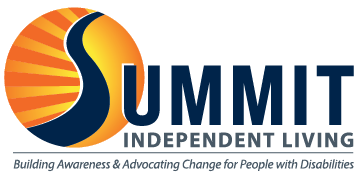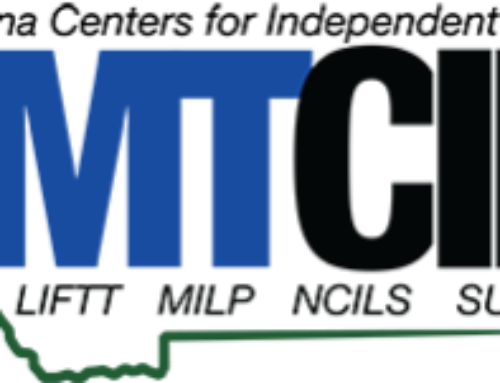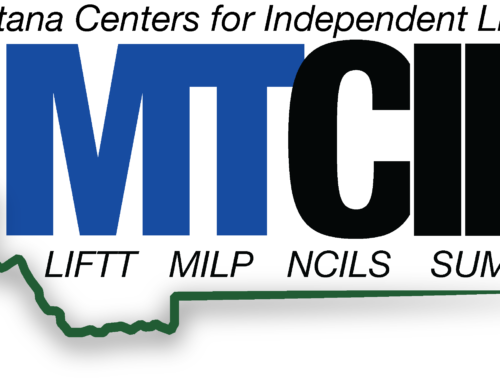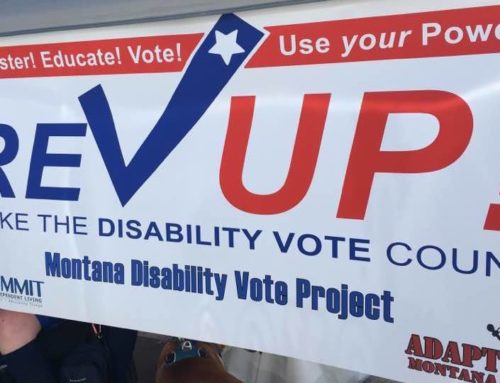The 2011 Legislature was a mixed bag for programs and services that many Montanans with disabilities rely on, especially considering the budget reductions many of these programs took before the legislature even started.
Before the 2011 Legislature began, human services were looking at substantial budget reductions in key programs that threatened to reduce essential services and make it even harder for consumers to access the services they need in order to remain living in their own homes and their own communities:
- The 2% provider rate increase for FY 2011 that was approved by the 2009 Legislature had already been taken away,
- Providers were on track to lose another 2% of their budget on July 1, 2011,
- 96 home and community based waiver slots were lost during the interim, and
- An additional 80 waiver slots that had already been put into use were scheduled to end on July 1, 2011.
The beginning of the 2011 session came with even more bad news. The Legislature chose to adopt an additional 5% spending reduction plan as a starting point for all budget negotiations. This plan contained additional harmful cuts to human services, including a 2.22% reduction in home and community based waiver funding; a 2.22% reduction in personal assistance services, which would have reduced meal prep time for individuals who need it to 4 hours per week, or about 11.5 minutes per meal; and the elimination of the Big Sky Rx program; as well as several other harmful cuts.
Despite the disheartening budget reductions that garnered the majority of our attention, there was good news as well. The Joint Appropriations Subcommittee on Health and Human Services approved $262,863 in ongoing funds to continue the Medicaid for Workers with Disabilities program and $1,081,866 to continue the Health Care for Health Care Workers program over the next biennium.
As the session grinded on, it wasn’t looking likely that the human services programs people with disabilities rely on for basic necessities were going to be adequately funded. Many legislators worked hard trying to get at least some of the funding for vital human services restored and Sen. Caferro (D-Helena) finally made some headway when her motion to provide funding for 180 home and community-based waiver slots was approved. This funding was important because now the 80 waiver slots that were going to be lost at the end of the fiscal year will be able to continue over the next biennium and the individuals using them will not lose services. The additional 100 waiver slots that were funded also meant that some of the 400-plus people who are currently on the waiting list could begin receiving much needed services.
However, under pressure from the nursing home lobby, the legislature placed restrictions on the funding, requiring that it had to be used for: individuals moving out of nursing homes, maintaining individuals in assisted living facilities, individuals at immediate risk of nursing home placement, or nursing home bed day costs. Despite our efforts to get these restrictions removed, they still remain and the issue has been referred to the Centers for Medicare & Medicaid Services to see whether or not nursing home bed day costs are even an allowable use of funding that had been appropriated as home and community-based services funding.
Both chambers of the legislature ultimately passed the budget while restoring almost none of the human service programs they had slashed. They even blocked some federal funding for programs like SNAP (food assistance) and LIEAP (Low Income Energy Assistance Program), though they did approve a one-time-only wage increase for direct caregivers on the Senate floor. Any hope that many people had of at least maintaining the existing level of services was quickly diminishing. Luckily, the legislative leadership, Sen. Peterson (R-Buffalo) and Rep. Milburn (R-Cascade), reached a deal with Governor Schweitzer and some, but not all, of the funding that so many had been fighting for was restored.
In the budget deal, the 2.22% reduction to the personal assistance program for meal preparation was restored with one-time-only funds, Big Sky Rx was fully restored, and aging services received $3,000,000 in one-time-only funding to help with programs like Meals on Wheels. The federal funding for the SNAP and LIEAP programs was also restored.
Unfortunately, the home and community based waiver program will still see a 2.22% plus another 2% rate reduction and the personal assistance program will also see a 2% rate reduction for the next biennium. For many providers, this means cutting back to 2009 funding levels and having to remain at that level until at least 2014.
Overall, human service programs that many people with disabilities rely on fared much better than was anticipated after the session, despite the significant losses that will occur in Medicaid provider rates. The 2013 legislative session will bring a new opportunity to seek funding for vital programs that allow people with disabilities and seniors to remain living in their own homes and communities at the lowest cost to the state.
2011 Legislative Session’s Bill Abridged List
Montana CIL Supported Bills
HB 252: Prohibit Department of Transportation from recovering indirect costs for federal grants
HB 252 passed both chambers of the Legislature and was signed into law by the Governor on March 25, 2011.
HB 485: Funding for youth in transition
HB 485 failed to pass the House Appropriations Committee on a 10-11 vote and was tabled in committee. The bill did not pass the session.
HB 395: Consider housing needs in discharge plans from mental health facilities
HB 395 failed to make it out of the House Judiciary Committee and did not pass the session.
SB 351: Revise laws governing managed care
SB 351 passed both chambers of the Legislature and was signed into law by the Governor on May 6, 2011.
HB 625: Provide wage increase to direct care employees in community-based services
HB 625 was tabled in the House Appropriations Committee and did not pass the session.
Montana CIL Opposed Bills
HB 31: Prevent providing vehicle to person who does not have driver’s license
HB 31 was tabled by the House Transportation Committee and did not pass the session.
HB 152: Revise proof of residency and identity requirements for voting
HB 152 passed both chambers of the Legislature but was vetoed by the Governor on May 5, 2011.
HB 139: Eliminate the Provider Rates Commission
HB 139 was tabled in the House Human Services Committee and did not pass the session.
HB 316: Redistribute certain revenue and income to the state general fund
Funding reductions for Section B (human services) programs were amended out of the bill. HB 316 went on to pass both chambers of the Legislature but was vetoed by the Governor on May 5, 2011.
HB 375: Reduce certain general fund transfers
The funding reduction for TransAid was restored by amendment. HB 375 went on to pass both chambers of the Legislature but was vetoed by the Governor on May 5, 2011 and a veto override failed on June 10.
HB 180: Revise Close of voter registration
HB 180 passed both chambers of the Legislature but was vetoed by the Governor on April 13, 2011 and the bill did not become law.
HB 638: Referendum to require proof of citizenship to receive state service
HB 638 passed both chambers of the Legislature and, since it is a referendum, does not require action by the Governor. Language from HB 638 will appear on the 2012 general election ballot for voters to decide if it becomes law or not.
Travis Hoffman, Advocacy Coordinator





Connect With Us